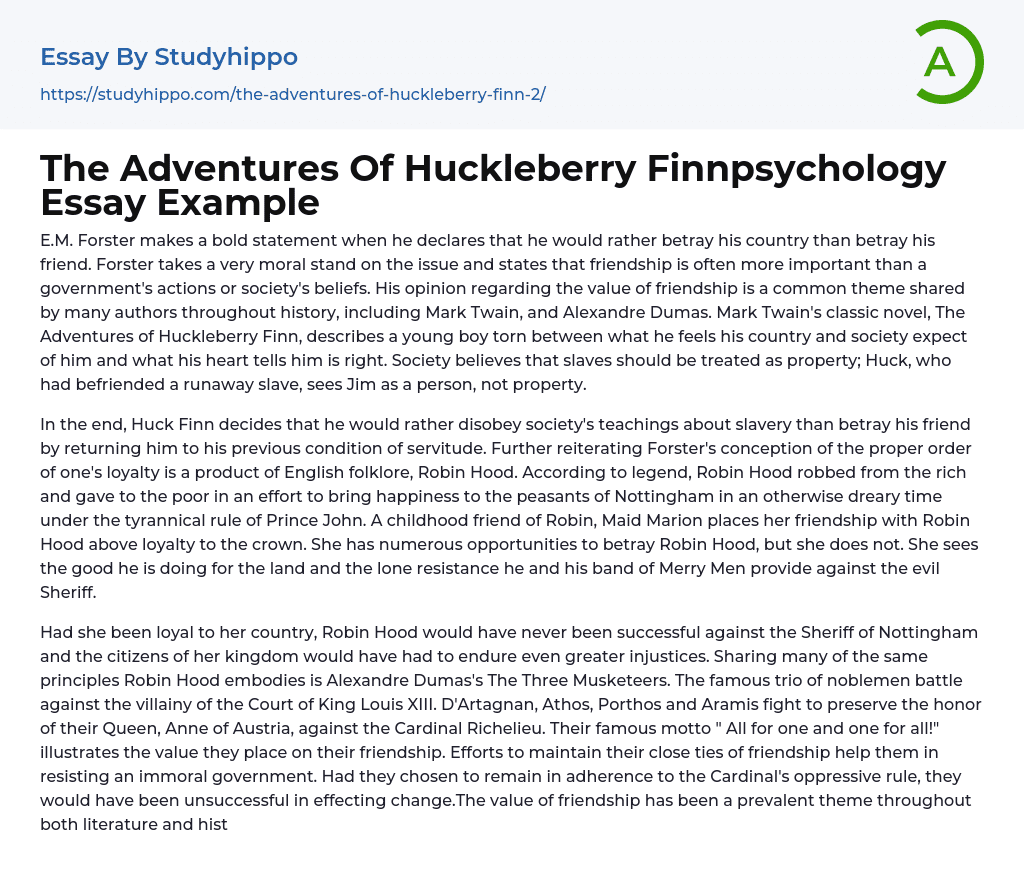E.M. Forster boldly expresses his preference to betray his country over betraying his friend, emphasizing the moral standpoint that friendship holds greater significance than the actions of a government or the beliefs of society.
Throughout history, many famous authors have explored the significance of friendship in their writings. Mark Twain and Alexandre Dumas often delve into this theme. In one of Twain's well-known novels, The Adventures of Huckleberry Finn, readers witness a young protagonist struggling with societal expectations while staying true to his own moral values. Despite society promoting the notion that slaves are mere property, Huck develops a deep connection with a runaway slave named Jim and acknowledges his humanity. Rather than treating Jim as an object, Huck perceives him as a deserving individual worthy of respect. Ultimately, Huck defies society
...'s beliefs about slavery and refuses to betray his friend by returning him to the life of servitude he had previously endured.
The text highlights Forster's belief in loyalty, using the story of Robin Hood as an example. According to legend, Robin Hood stole from the rich and gave to the poor, bringing happiness to the people of Nottingham during a difficult time under Prince John's oppressive rule. Maid Marion, who was friends with Robin Hood since childhood, values her friendship with him above her loyalty to the crown. Despite multiple opportunities to betray Robin Hood, she remains faithful. She acknowledges his positive impact on the land and how he and his Merry Men resist the corrupt Sheriff. Had she chosen to prioritize loyalty towards her country instead, Robin Hood would not have been able to defeat the Sheriff of Nottingham, resulting in even greater injustic
for their kingdom's citizens.
The novel The Three Musketeers by Alexandre Dumas draws similarities to Robin Hood in terms of principles. The story revolves around a group of noblemen – D'Artagnan, Athos, Porthos, and Aramis – who confront the corruption within King Louis XIII's Court. Their main goal is to protect Queen Anne of Austria's honor as she fights against Cardinal Richelieu. Their motto "All for one and one for all!" represents their strong friendship and its significance to them. By prioritizing their bond, they are able to defy an unjust government and challenge the oppressive rule of the Cardinal. This theme of camaraderie holds great importance both in literature and history.
Various authors from different eras have explored the ethical conflict between friendship and loyalty to one's country. The leaders and policies of governments may change, but friendships endure for a lifetime.
- Abnormal Psychology essays
- Social Psychology essays
- Developmental Psychology essays
- Jean Piaget essays
- Positive Psychology essays
- Classical Conditioning essays
- Counseling essays
- Psychoanalysis essays
- Educational Psychology essays
- Behaviorism essays
- Authority essays
- Operant Conditioning essays
- Maslow's Hierarchy Of Needs essays
- Mental Health essays
- Personality Psychology essays
- Psychotherapy essays
- Family Therapy essays
- Stanford Prison Experiment essays
- Abraham Maslow essays
- Erik Erikson essays
- Cognitive Psychology essays
- Sigmund Freud essays
- Attachment Theory essays
- Supersize Me essays
- Individual essays
- Infant essays
- Childhood essays
- Adolescence essays
- Growth Mindset essays
- Is Google Making Us Stupid essays
- Childhood Memory essays
- Positive Attitude essays
- Reinforcement essays
- Archetype essays
- Maturity essays
- Deception essays
- Certainty essays
- Conformity essays
- Aggression essays
- Behavior essays
- Human Behavior essays
- Obedience essays
- Adult essays
- Procrastination essays
- Morality essays
- Altruism essays
- Human Sexuality essays
- Role Model essays
- Perseverance essays
- Expressive essays




